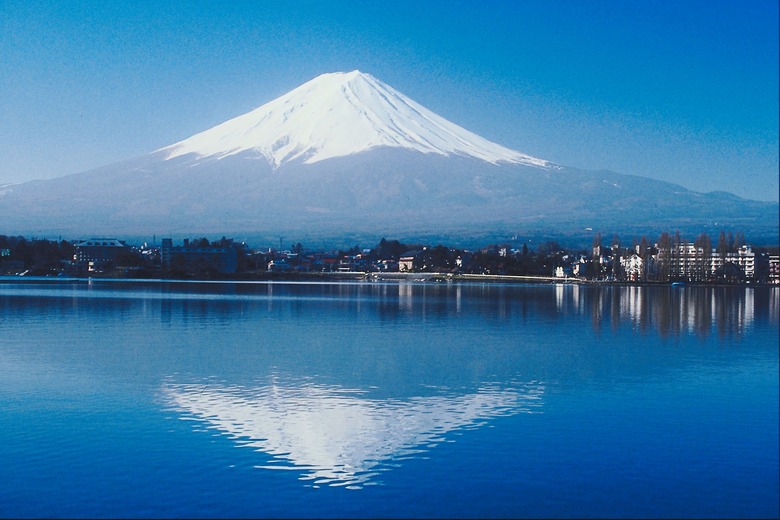What Types Of Volcanoes Are Violent With Steep Slopes?
Volcanoes are vents in the Earth's crust that periodically expel lava, gas, rock and ashes. Some types of volcanoes explode quite violently, and many of these types look like hills or mountains with steep slopes. These slopes may be covered in vegetation and barely recognizable as volcanoes, depending on the dates of their last eruptions. There are three types of volcanoes that erupt violently and also possess steep slopes.
Distinguishing Features and Mechanisms
Distinguishing Features and Mechanisms
Whether a volcano explodes with violent force depends on the consistency of the magma, or molten rock, inside of it. Volcanoes that contain thin, runny magma — like those that made the Hawaiian chain of islands — don't typically produce violent explosions, while those with thick, viscous magma do. This is due to the fact that thinner magma allows potentially explosive gases to easily exit into the atmosphere, while thicker magma prevents these gases from escaping. The denser type of magma often contains silica, which acts as a thickening agent. Eventually, the gases build up and exert so much pressure on the volcano that it bursts open in a violent eruption. Once it has erupted, magma is called lava. Many of the world's most violently-exploding and steeped-sloped volcanoes are located near subduction zones. Subduction zones are tectonic plate boundaries in which oceanic plates slide underneath continental plates. Examples of subduction zones include the coastal U.S. Pacific Northwest and southern Alaska, which contain numerous violent, steep-sided volcanoes, such as the infamous Mount St. Helens.
Composite Volcanoes
Composite Volcanoes
Approximately 60 percent of the volcanoes on Earth are composite volcanoes. Also known as stratovolcanoes, these steep-sided symmetrical mountains can rise to heights of 8,000 to 10,000 feet (2,438 to 3,048 meters). Some of the world's most majestic mountains are composite volcanoes, including Washington's Mount Rainier and Mount St. Helens, Oregon's Mount Hood, Japan's Mount Fuji and Italy's Mount Etna. Each of these volcanoes contains a conduit system that extends deep below the Earth's crust and culminates in a magma-containing reservoir. Stratovolcanoes generally experience long periods of dormancy between eruptions, but when they do erupt, they usually do so with great ferocity, spewing lava and ash high into the air, and sometimes causing avalanches, landslides and mudflows.
Cinder Cones
Cinder Cones
Cinder cones are simple, easily recognizable volcanoes. Made from loose, granular cinders, they are circular or oval in shape and contain bowl-shaped craters at their summits. They don't attain the soaring heights of composite volcanoes, generally rising no more than 1,000 feet (304 meters) above the surrounding landscape. They also don't emit an enormous volume of materials like stratovolcanoes. However, they feature very steep slopes and forceful explosions in which gas-charged lava blows out violently. Cinder cone volcanoes are relatively common in western North America. Examples include Paricutin in Mexico and the unnamed volcano on Wizard Island in Oregon's Crater Lake.
Lava Domes
Lava Domes
Lava dome volcanoes typically develop out of composite volcanoes, when small, thick, bulbous pools of lava collect around a volcano's vent following an eruption. Lava domes can grow quickly, becoming noticeably larger over a period of mere months. They often form steep-sided mounds, some of which may be so steep that they appear as obelisks. Lassen Peak in California and Mont Pelee on the island of Martinique are types of lava dome volcanoes. Also, lava domes may be contained within other types of volcanoes, such as the Novarupta Dome, which is located inside Alaska's Katmai volcano, and several unnamed domes within Mount St. Helens' crater.
References
- US Geological Survey: What Is a Volcano?
- LiveScience: Volcano Facts and Types of Volcanoes, Mary Bagley
- US Geological Survey: How Do Volcanoes Erupt?
- US Geological Survey: Principal Types of Volcanoes
- South Carolina Geological Survey: Types of Volcanoes
- Wheeling Jesuit University / Center for Educational Technologies: Types of Volcanoes
- San Diego State University: How Volcanoes Work, Mont Pelee Eruption 1902
- Oregon State University – Volcano World: Subduction Zone Volcanism
Cite This Article
MLA
Harris, Amy. "What Types Of Volcanoes Are Violent With Steep Slopes?" sciencing.com, https://www.sciencing.com/types-volcanoes-violent-steep-slopes-6773/. 24 April 2017.
APA
Harris, Amy. (2017, April 24). What Types Of Volcanoes Are Violent With Steep Slopes?. sciencing.com. Retrieved from https://www.sciencing.com/types-volcanoes-violent-steep-slopes-6773/
Chicago
Harris, Amy. What Types Of Volcanoes Are Violent With Steep Slopes? last modified March 24, 2022. https://www.sciencing.com/types-volcanoes-violent-steep-slopes-6773/
